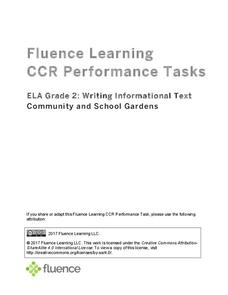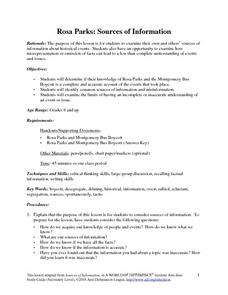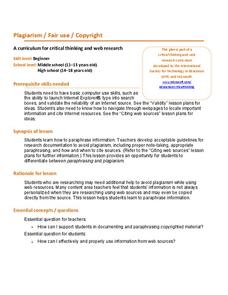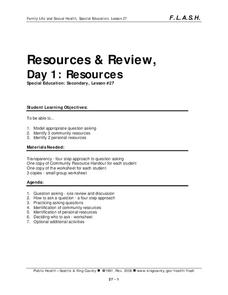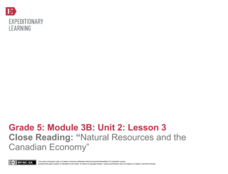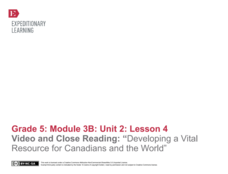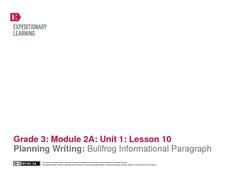K12 Reader
Using Prior Knowledge
Sometimes it's hard to relate to a new text. Teach kids to use their prior knowledge when reading something new with a comprehension exercise. A short passage tells them how to think of their brains like filing systems, and provides five...
National Math + Science Initative
Reading an Informational Text: "It All Started with Sputnik"
Sputnik was one of the greatest scientific advancements of the 1950s, and this reading lesson does it justice. Pupils start off with pre-reading questions and a video. They then read an excerpt from an article, which is accompanied by...
Fluence Learning
Writing Informative Text: Did Shakespeare Write Shakespeare?
William Shakespeare penned some of the richest and most fascinating works of literature—or did he? Middle schoolers read three brief informative passages and conduct additional research to evaluate the claim that Shakespeare did not...
Fluence Learning
Writing About Informational Text: Political Parties
To demonstrate their ability to craft an analysis of informational text, class members read excerpts from James Madison's "The Federalist No. 10," from George Washington's Farewell Address, and from Thomas Jefferson's First Inaugural...
Fluence Learning
Writing Informational Text: Community and School Gardens
Two informational texts feature community gardens of the past and present and how seeds grow. Scholars read, discuss what they have read, complete a timeline, define words, and compose a brief essay about the texts' main idea.
iKeepSafe
The First Amendment, Copyright, and Fair Use
Do I have a right to make a copy? Head off this commonly asked question with this colorful, informative infographic, and promote digital citizenship in your class by directing learners to ask the right questions before downloading...
Teach-nology
Author’s Purpose: Inform
Why does an author write an informative article? Learners examine passages of a short reading on Spain and determine what the author wanted to inform the reader about.
Florida Center for Reading Research
Comprehension: Text Analysis, Persuade, Inform, and Entertain Sort
Why do authors write? Practice determining the author's purpose with a categorizing activity. Learners sort twelve short passages into three categories: persuade, inform, and entertain.
West Virginia Department of Education
History Scene Investigators - John Brown's Raid
An informative resource covers the event of John Brown's Raid, an event that became an important part of West Virginia history. It serves as a standalone and covers the event and John Brown's life in depth using group work, online...
Anti-Defamation League
Rosa Parks: Sources of Information
Young scholars show what they know about Rosa Parks and the incident on one of the buses in Montgomery, Alabama. Groups discuss and identify where they receive most of their information. They examine the importance of having a complete...
Teach Engineering
What is GIS?
Is GIS the real manifestation of Harry Potter's Marauders Map? Introduce your class to the history of geographic information systems (GIS), the technology that allows for easy use of spatial information, with a resource that teaches...
Australian National Botanic Gardens
Aboriginal Plant Use in South-Eastern Australia
The Aboriginal people of Australia survived for over 40,000 years by using the plants that grow in the bush for food, medicine, tools, and utensils. Introduce young botanists to the wonders of the Outback with a 25-page packet that...
Mark Twain Media
Understanding Informational Text Features
Everything you need to know about informational text features can be found in this resource. Recognizing these types of text features and how they are used in text allows readers to better understand information. Teachers can use this as...
PBS
Math with Jake: Transposition Using Ratios
The star of the show is ratios. The informative resource explains how to transpose music using ratios. Individuals transpose the song "Twinkle, Twinkle" in the activity by applying their ratio skills. The activity challenges class...
DiscoverE
Nanosolutions
There are a billion reasons to use the resource! Well, not quite. A demonstration using food color and water shows scholars the meaning of nano. An iterative process results in diluting the concentration of food coloring by one tenth...
Microsoft
Plagiarism Fair Use Copyright
Nothing makes junior high and high school teachers more frustrated than plagiarism. Instruct young writers about copyright laws and the correct ways to paragraph information without copying the exact words. A set of secondary-level...
Howard Hughes Medical Institute
Spreadsheet Tutorial 3: Column Graphs, Error Bars, and Standard Error of the Mean
There's absolutely no error in using the tutorial! Learners use spreadsheets to create column or bar graphs with error bars. They also learn how to calculate the standard error of the mean in the tutorial. This is the third installment...
King Country
Lesson 27: Resources & Review - Day 1: Resources
To conclude a unit on family life and sexual health (FLASH), class members use the skills they have practiced in previous lessons to develop strategies for getting information or help when they need it.
EngageNY
Close Reading: “Natural Resources and the Canadian Economy”
Readers continue to learn how natural resources are important to Canada's economy. They read, annotate, and answer text-dependent questions about Natural Resources and the Canadian Economy. They then discuss key terms in the text.
EngageNY
Video and Close Reading: “Developing a Vital Resource for Canadians and the World”
Scholars watch Developing a Vital Resource for Canadians and the World to learn about the supplement potash that helps plants grow. They watch the video several times, completing a note catcher to record key ideas along the way. Pupils...
Curated OER
Using Information Resources: Lesson 2
Students are introduced to the various information resources. Individually, they practice skimming the table of contents, glossary and photographs in the excerpts. To end the lesson, they identify key words and answer questions in a...
EngageNY
Documenting Research: Sorting and Recording Information About the Wheelwright
Fourth graders practice using a graphic organizer to record their notes and answer text-dependent questions while supplying evidence of how they found their answer. They focus on a machine called the wheelright, which was commonly used...
EngageNY
Mid-Unit 2 Assessment: On-Demand Informational Writing
Lesson 7 focuses on building academic vocabulary and writing an explanatory letter with supported textual evidence. For the first five minutes of the lesson plan, the educator reminds the class of how to read and refer to the accordion...
EngageNY
Planning Writing: Bullfrog Information Paragraph
Lesson ten in this unit for the book Bullfrogs at Magnolia Circle, prepares third graders to begin writing an informational paragraph about the adaptations of bullfrogs. First, young writers work either independently or in pairs to...






